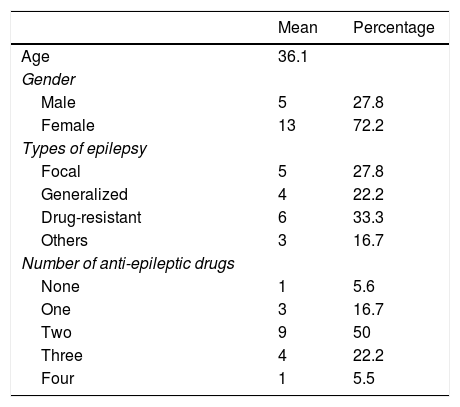Over the years, educational lines have focused on providing education and information to patients. The empowerment of the patient means involving him in his self-care and making it part of his disease process. Therefore, to improve our difficulties in education, it is necessary to identify the knowledge needs of patients in relation to their disease.
ObjectiveTo explore the expectations of epilepsy patients regarding the health education received.
Method designdescriptive qualitative study from a hermeneutical perspective. Subjects: Intentional sampling of 18 patients with epilepsy volunteers to participate in health education sessions between January and July 2019. Data collection and analysis: Documentary technique through analysis of the wording to the question about their expectations in education sessions.
ResultsWe obtained 10 codes that are codified in 3 subcategories of expectations in education: learning and disease management, problems with mood and interaction and sharing with other people with epilepsy. The latter merge into 2 broad categories: Self-management and internal growth.
ConclusionsPatients with epilepsy, when attending group health education sessions, not only hope knowledge and management of the disease and crisis, but also hope and share their experiences with other patients, professional emotional support and know the treatment options and social resources.
Durante años, las intervenciones educativas enfermeras se han centrado en proporcionar educación e información a los pacientes. El empoderamiento del paciente supone involucrarlo en su autocuidado y hacerlo partícipe de su proceso de enfermedad. Por ello, para mejorar nuestras intervenciones en educación, es necesario identificar las necesidades de conocimiento de los pacientes en relación con su enfermedad.
ObjetivoExplorar las expectativas de los pacientes de epilepsia respecto a la educación sanitaria recibida.
Métodoestudio cualitativo descriptivo desde perspectiva hermenéutica. Sujetos: muestreo intencionado de 18 pacientes con epilepsia voluntarios que participaron en las sesiones de educación sanitaria entre enero y julio 2019. Recogida y análisis de datos: Técnica documental mediante análisis de redactados a la pregunta sobre sus expectativas en las sesiones de educación.
ResultadosSe obtienen 10 códigos que se codifican en 3 subcategorías de expectativas en la educación: aprendizaje y manejo de la enfermedad, intervenciones sobre estado de ánimo e interacción y compartir con otras personas con epilepsia. Éstas últimas se fusionan en 2 grandes categorías: Autogestión y crecimiento interno.
ConclusionesLos pacientes con epilepsia, al acudir a sesiones grupales de educación sanitaria, no sólo esperan conocimientos y gestión de la enfermedad y crisis, sino que también esperan comunicarse y compartir sus experiencias con otros pacientes, soporte emocional profesional y conocer las opciones de tratamiento y recursos sociales.
Article
Diríjase al área privada de socios de la web de la SEDENE, (https://sedene.com/revista-de-sedene/ ) y autentifíquese.








